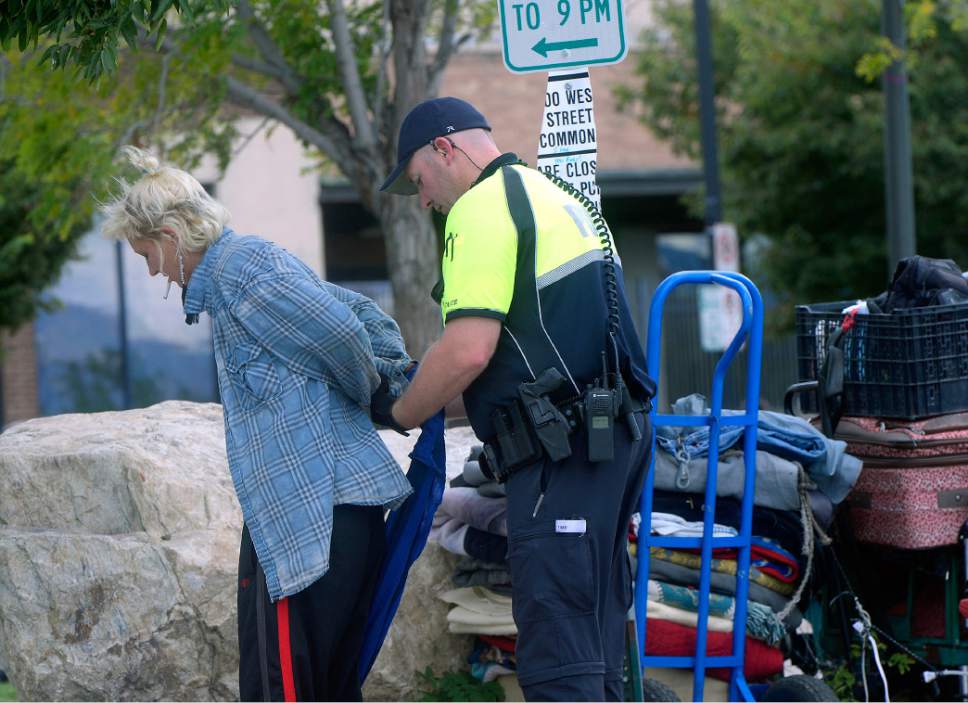This is an archived article that was published on sltrib.com in 2016, and information in the article may be outdated. It is provided only for personal research purposes and may not be reprinted.
Two public hearings are on the Salt Lake County Council's agenda Tuesday.
The first, at 4 p.m., will seek public comment on Mayor Ben McAdams' proposal to invest $3.75 million in two "Pay for Success" programs, one aiming to reduce homelessness, the other to lower jail recidivism.
Two hours later, the council will let the public weigh in on the changes it has made to the mayor's proposed $1.2 billion budget for 2017. The biggest revision involves cutting Pay for Success by $750,000, using that money to pursue the same fight but in a different way.
The council wants to apply $500,000 to extending substance abuse and mental-health treatment services from April to July for people entered into programs through the recent Operation Diversion roundups in downtown Salt Lake City. That joint county-city effort is aimed at curbing illegal drug trafficking by arresting dealers and diverting addicts into treatment.
Another $250,000 would be dedicated, in the council plan, to an initiative to combat opioid abuse. The county district attorney's office helped kick off the effort earlier this fall, providing funding to equip Unified Police Department officers with anti-overdose kits.
The Pay for Success plan is a key piece of both McAdams' budget, which does not require a tax increase, and his multiyear plan to address criminal-justice reform by attacking its root causes.
In this approach, the county has lined up corporate lenders and philanthropic groups to underwrite programs to get people housing and drug-addiction or mental-illness treatment to stop the revolving door between the jail and homeless shelter.
For more than a year, county director of data and innovation Fraser Nelson has led an effort to have The Road Home pursue a plan for reducing homelessness, while First Step House will set up behavioral and mental-health treatment programs.
Both programs are designed to achieve specific success rates based on a variety of criteria. If the programs reach those benchmarks, the county will repay the investors with interest. If they don't succeed, the county has no repayment obligations.
Nelson told the council that four senior lenders would invest up to $6.5 million:
• Northern Trust Bank in Chicago.
• Ally Bank in Midvale.
• Reinvestment Fund, a Philadelphia-based "catalyst for change in low-income communities."
• QBE Insurance from Australia.
Another $2 million in subordinate loans have been pledged by the Sorenson Global Impact Investing Center at the University of Utah and New York City-based Living Cities, a collaboration of foundations and financial institutions dedicated to low-income urban residents.
In addition, Nelson said the county secured $3.1 million in grants from the Larry H. & Gail Miller Foundation, Zions Bank, Ray & Tye Noorda Foundation and the federal Emergency Services Grant program.
While McAdams' approach generally has council support, several Republican members have reservations about the untested nature of Pay for Success.
They also believe people directed into treatment through Operation Diversion needed more time in programs, otherwise efforts to deal with their issues will be wasted, and that funds diverted from Pay for Success still would be aimed at accomplishing similar goals.
As Councilman Michael Jensen noted during one exchange in a lengthy debate, "last year we started down the road [believing] that getting folks the treatment they need is huge. … We can lock people up but without treatment and beds we have a backlog and a problem. … These are all different approaches to get to the same end result."
The council also reallocated nearly $300,000 in spending from the mayor's budget, largely from the elimination of one employee, the demise of an anti-gang initiative and cutting off a $50,000 dues payment to the Economic Development Corporation of Utah (which already was slashed from $250,000 in McAdams' proposed budget).
The largest individual share of that money, about $150,000, will go toward a supplemental 401(k) contribution to eliminate a compensation inequity for some county jail employees.
"We need to do something to keep the jail up and running. If you don't have somebody controlling the keys, it doesn't matter how many beds you have there" for people targeted by the Pay for Success program, said Councilman Steve DeBry, a Unified Police Department officer.
"The sheriff is having trouble keeping people employed there," he added. "We need to take care of these people to keep the inn open."
Overall, more than 3,000 county employees will receive a 3 percent raise in the 2017 budget, but the county's contribution to their 401(k) plans will end.





